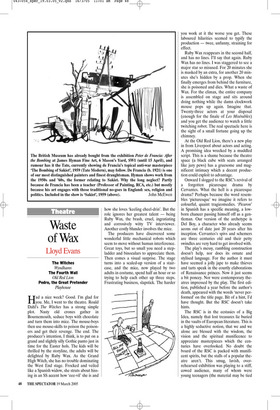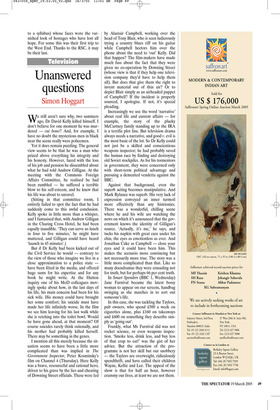Waste of Wax
Lloyd Evans
The Witches Wyndhams The Fourth Wall Old Red Lion Pedro, the Great Pretender Playhouse Had a nice week? Good. I’m glad for you. Me, I went to the theatre. Roald Dahl’s The Witches has a strong simple plot. Nasty old crones gather in Bournemouth, seduce boys with chocolate and turn them into mice. The mouse-boys then use mouse-skills to poison the poisoners and get their revenge. The end. The producer’s intention, I think, is to put on a grand and slightly silly Gothic panto just in time for the Easter hols. The kids will be thrilled by the storyline, the adults will be delighted by Ruby Wax. As the Grand High Witch, she has no trouble dominating the West End stage. Frocked and veiled like a Spanish widow, she struts about hissing in an SS accent how ‘eee-vil’ she is and how she loves ‘keeling cheel-drin’. But the role ignores her greatest talent — being Ruby Wax, the brash, cruel, ingratiating and corrosively witty TV interviewer. Another costly blunder involves the mice.
The producers have discovered some wonderful little mechanical robots which seem to move without human interference. Great toys, but so small you need a stepladder and binoculars to appreciate them. Then comes a visual surprise. The stage turns into a scaled-up version of a staircase, and the mice, now played by two adults in costume, spend half an hour or so trying to help each other up three steps. Frustrating business, slapstick. The harder you work at it the worse you get. These laboured hilarities seemed to typify the production — twee, unfunny, straining for effect.
Ruby Wax reappears in the second half, and has no lines. I’ll say that again. Ruby Wax has no lines. I was staggered to see a major star so misused. For 20 minutes she is masked by an extra, for another 20 minutes she’s hidden by a prop. When she finally emerges from behind the furniture, she is poisoned and dies. What a waste of Wax. For the climax, the entire company is assembled on stage and sits around doing nothing while the damn clockwork mouse pops up again. Imagine that. Twenty-three actors at your disposal (enough for the finale of Les Misérables) and you get the audience to watch a little twitching robot. The real spectacle here is the sight of a small fortune going up the chimney.
At the Old Red Lion, there’s a new play in from Liverpool about actors and acting. A promising idea wrecked by a muddled script. This is a shame because the theatre space (a black cube with seats arranged like jury pews) has a gruesome and magnificent intimacy which a decent production could exploit to advantage.
Onward I slogged to the RSC’s revival of a forgotten picaresque drama by Cervantes. What the hell is a picaresque drama? Perhaps because the word resembles ‘picturesque’ we imagine it refers to colourful, quaint tragicomedies. ‘Picaron’ in Spanish has a specific meaning, a lowborn chancer passing himself off as a gentleman. Our version of the archetype is Del Boy, a character who already seems aeons out of date just 20 years after his inception. Cervantes’s spivs and schemers are three centuries old and their petty swindles are very hard to get involved with.
The play’s messy, rambling construction doesn’t help, nor does its ornate and stylised language. For the author it must have seemed a jolly jape to make thieves and tarts speak in the courtly elaborations of Renaissance princes. Now it just seems a bit poncey. Nor were contemporary theatres impressed by the play. The first edition, published a year before the author’s death, appeared with the words ‘never performed’ on the title page. Bit of a hint, I’d have thought. But the RSC doesn’t take hints.
The RSC is in the ecstasies of a Big Idea, namely that lost treasures lie buried in the vaults of European literature. This is a highly seductive notion, that we and we alone are blessed with the wisdom, the vision and the spiritual munificence to appreciate masterpieces which the centuries have overlooked. No doubt the board of the RSC is packed with munificent spirits, but the stalls of a popular theatre aren’t. This smug, lavish, overrehearsed exhibition was playing to a stiff, cowed audience, many of whom were young teenagers (the material may be tied to a syllabus) whose faces wore the varnished look of hostages who have lost all hope. For some this was their first trip to the West End. Thanks to the RSC, it may be their last.

















































 Previous page
Previous page